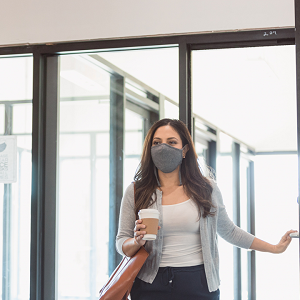Challenges of the Next Normal: Returning to the Office
 By Daniel N. Jolivet, PhD
By Daniel N. Jolivet, PhD
Workplace Possibilities Practice Consultant
The Standard
Over the course of the COVID-19 pandemic, many people have talked about a “return to normal,” but our post-pandemic reality may be significantly different from our lives before it. Even with effective vaccines, the United States is unlikely to reach herd immunity until the third quarter of 2021.1 The percentage of people who say they will not be vaccinated, however, makes it possible we will never reach it.2 Masks, social distancing, and frequent sanitizing are almost certain to remain a feature of our lives for the foreseeable future.
Nonetheless, we’ve already seen adjustments such as the loosening of government restrictions and easing guidelines from the Centers for Disease Control and Prevention (CDC), especially for people who have been vaccinated. Some employers are reopening offices they closed when the pandemic first hit.
Expect Delayed Impacts to Behavioral Health
Americans are experiencing significantly higher rates of behavioral health conditions during the pandemic. Mental distress in general is impacting 46% of the adult working population, while 49% screened positive for problem use of alcohol, drugs, or prescription medication during the prior year.3 The CDC has documented elevated rates of anxiety and depression among American adults since April 2020, continuing to the present.4 Post-traumatic stress disorder (PTSD) is a known complication of COVID-19 infection,5 but it has also impacted the general public. The drug overdose rate has risen to the highest level on record.
Research on previous pandemics has found that psychological issues, particularly anxiety and PTSD, may develop after the crisis has passed.6 Similarly, many people were unable to observe the usual customs and rituals when a loved one died during the pandemic, so the depth of the loss may not have impacted them yet. These issues are obviously compounded by other stressors. Job worries, economic turbulence, natural disasters, political divisions, and social unrest have all contributed to the difficulties Americans are facing.
These findings suggest that workers returning to the office may have new conditions that will require support. Visible reminders of the pandemic, such as masks and new safety protocols, may trigger anxiety attacks and PTSD for employees returning to the office. Workers who have been able to cope with poor sleep by getting up later or not showering before work, or who have been drinking or using drugs during the day, may find it difficult to adjust to a more regular schedule and a daily commute.
Employers are likely to receive more requests for reasonable accommodations related to alcohol use, anxiety, depression, opioid misuse, drug abuse, and PTSD. Such requests are particularly likely among people who’ve been directly impacted by one or more of these stressors. This includes employees who were diagnosed with COVID-19; those who had a significant other die from the infection; workers who were furloughed or laid off and are now struggling financially; women who have been juggling work with childcare and/or eldercare responsibilities; employees who have been sheltering in place with an abusive partner; and Black employees or other marginalized groups who may be dealing with race-based traumatic stress.7
Full content is available to DMEC members only. to view the complete resource.
If you are not a DMEC member, we encourage you to join. DMEC members have access to white papers, case studies, @Work magazine articles, free webinars, legislative updates, and much more. These resources will assist you in building an effective and compliant integrated absence management program, saving you time, resources, and money. Learn more.
If you are being asked to log in more than once, please refresh your browser.



